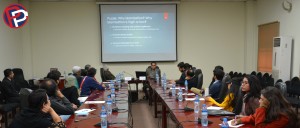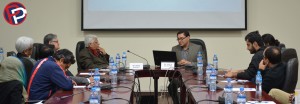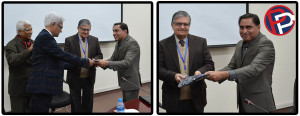
Book Launching Ceremony
Seminar
Past Event
The Center for Public Policy and Governance held a book launching ceremony on 12th December, 2018 of the book “State, Nationalism and Islamization: Historical Analysis of Turkey and Pakistan” (Palgrave Macmillan, 2017) authored by Assistant Professor CPPG, Dr. Raja M. Ali Saleem. Mr. Ali Jaffer Zaidi is London based Pakistani intellectual, author, social activist and politician, who was guest of honor at the Seminar.
Dr. Ali started his presentation by introducing the theme of his book, which primarily identifies the links between the state, nationalism and Islamization. He said that this book was a result of his PhD thesis and refers to research he conducted during that time. His book looks into the history of both Pakistan and Turkey and how Islamization still continues to be an issue in both these countries and in the Muslim world at large. His main argument is that increase in Islam’s role in state’s nationalism will lead to more Islamization of the government.
He chose to work on these two countries, as they are both Muslim Majority Countries (MMC) but quite dissimilar when it comes to the role of religion in state affairs. Turkey has historically been a secular state, successfully keeping a distance between religion and government. Pakistan on the other hand has always been associated with Islam as manifested through its earlier constitutions and national symbols. In his book, Dr. Ali looks at how these trends have changed and oscillated over time.
By Islamization of the State, Dr. Ali said that he chose to use the more conventional definition, in which ‘Islamization’ implies more conservative and traditional forms of Islamic practices. The discussion progressed with Dr. Ali defining the key components used by statesman to promote Islamization over the course of the history of both Pakistan and Turkey. The key components are state nationalism, the constitution, national symbols and banknotes. The presence of the Ministry of Religious Affairs is also an indicator of whether or not a state is moving towards more traditional Islamic ideologies. Similarly a country’s approach on Family Laws and the role of religion in determining these laws can also suggest the extent of Islamization of the state. National flags, Presidential flags/ seals and city emblems are other national symbols that can be studied to understand the level of state Islamization.
In Turkey’s case Dr. Ali argued that Islamization of the state had decreased as the Ottoman Empire had declined and its influence on the modern Republic began to fade. However the trend of Islamization of the State gradually increased, especially since Ataturk’s demise in the late 1930s. In Pakistan, there was rise in the Islamization of the state since its Independence, particularly during the 80s but in its more recent history, the country has experienced a decline in Islamization of the state. Although the past year or two indicate some variations with certain incidents suggesting a greater role of Islam in the state, he felt that Pakistan would continue to witness a fall in Islamization policies in the near future.
Abstract
In his book, Dr. Saleem does a comparison of Islam’s role in Pakistani and Turkish state nationalism in different periods of their history and argues that it is an important predictor of the Islamization of government. The comparison is fascinating as Turkey was an unequivocally secular country until recently and Pakistan is a country synonymous with Islamization. Dr. Saleem’s research establishes a causal link between Islam’s role in state nationalism and Islamization of government during various periods of the history of both countries. The indicators used to establish the causal link between Islam’s role in state nationalism and Islamization are the presence of Islamic provisions in the constitution, Islam-inspired national symbols, Islamic images on the national currency, Islamic basis of family law, a Department of Religious Affairs, and governmental support for religious education. Dr. Saleem concludes his arguments by identifying three causal mechanisms—legitimacy, mobilization, and authenticity—that link Islam’s role in state nationalism and the Islamization of government.




